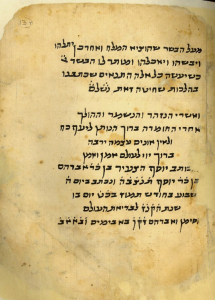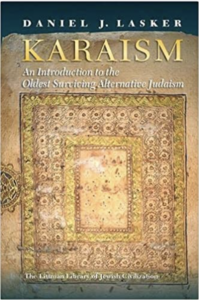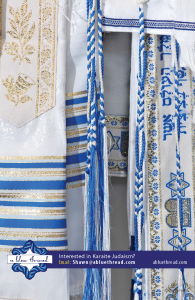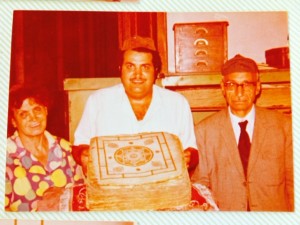I love this book. It is a perfect overview and amazing introduction to Karaite Judaism. Even I – who has been studying Karaite Judaism formally for 20+ years (and informally my entire life) – learned a tremendous amount from this book. After the jump, you can watch my video review of the book, and you can also vote on which book I do a video review of next. I’ll also describe more parts of the book that I absolutely love – and one part that I absolutely disagree with.
Category Archives: Aharon ben Eliyahu
Restoring the Crown of the Torah: H’ Aaron ben Elijah’s Keter Torah in the Works
Over the last few weeks, I have been corresponding with some of the leading professors in Karaitica to get a particular Arabic Karaite commentary translated into English. One of these professors explained to me how daunting the task is, and respectfully suggested that I work on H’ Aaron ben Elijah’s Keter Torah (meaning Crown of the Torah), which he described as “the authoritative [Karaite] commentary on the Torah.”
Indeed, the significance of this work cannot be understated: it helped inspire the name of the Keter Torah Karaite synagogue in Ashdod.
The Karaite Press, a project of the Karaite Jews of America, is currently working on an edition of Keter Torah. Today I show you what the project entails and – just in time to start the Torah’s reading of Parashat Devarim – you can get a draft of the commentary on that parasha.
Women on the Fringes: Which Karaite Sages got it Right? (Reader Poll)
I was recently having a discussion with a fellow Karaite regarding the various stages of Karaite thought. In brief, he summarized that there were (in his estimation, as well as others) three main periods of Karaite halakhic literature: (i) early; (ii) late; and (iii) very late. Today, I am going to use the example of women and techellet and demonstrate how each of these periods approached this issue.
In my opinion, we can trace the decline of the Karaite movement by looking at the methods these sages employed in explaining our religious conclusions, regardless of whether we agree with the ultimate conclusion itself. At the end, you get to vote who got it right.
Are the Historical Karaite Jewish Objections to Hanukkah Still Relevant Today?
In 1979, Hadassah Magazine visited the last remaining Karaite Jews of Cairo, Egypt. The magazine provides this tidbit regarding the shochet of the community, Farag Murad Yehuda Menashe:
[H]e will read a Haggada based on biblical texts, free of all Talmudic references. He will have no seder plate, no four questions, and no four cups of wine. His Shavuot will always fall on Sunday, and instead of fasting on the Ninth of Av, he will fast on the seventh and tenth. He has never heard the shofar blown, never put on tefillin, and never affixed a mezuzah to the doorpost of his home, and never lit a hanukkiya. (Indeed, Hanukkah is totally absent from his calendar.)[1]
Filed under Aharon ben Eliyahu, Hanukkah, Jacob ben Reuben, Mikdash Me'at, Purim
Why I Choose to Eat “Ashkenazi” Karaite Meat
 Breaking News: Earlier this morning, the Supreme Court of the State of Israel
Breaking News: Earlier this morning, the Supreme Court of the State of Israel
ruled in favor of the Karaites in a court case against the State’s religious authorities, who had tried to prevent Karaites from slaughtering in independent slaughterhouses that were under the Rabbanut’s supervision. I dedicate this post to everyone who worked so hard on that case.
* * * *
In the Rabbinic community, there are famous debates concerning the minhagim (and halakha) of Ashkenazi and Sefardi Jews. Everyone is familiar with the Passover/kitniyot debate. And historically it was the case that if you were from an Ashkenazi family, you followed your own minhag; and your Sefardi friends followed their own.
Geographic divisions like this, tend not to exist in the Karaite community. But historically there was one debate that divided the Karaites on theological lines, and caused a rift among geographical lines that somewhat reflects the Ashkenazi/Sefardi divide in the Rabbinic community.
Filed under Aharon ben Eliyahu, Kashrut, Maimonides, Passover, Shechita, Turkey, Yisrael HaMa'aravi
The Karaite Kitniyot Experiment
 Are Karaites the original Food Detectives?
Are Karaites the original Food Detectives?
The Karaites of the middle ages actually conducted experiments to determine whether the flours of grains and kitniyot (usually translated as “legumes”) can become hametz (leaven). And with the help of Yochanan Labombarbe, the Dean of Students for the Karaite Jewish University, we’ve recreated (most of) those experiments.
Filed under Aharon ben Eliyahu, Karaite Korner, Passover, Yaqub al-Qirqisani





